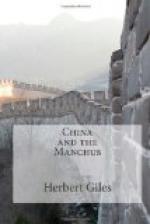The next seventy years were freely marked by raids, first of one side and then of the other; but by the close of the twelfth century the Mongols were pressing the Nue-chens from the north, and the southern Sungs were seizing the opportunity to attack their old enemies from the south. Finally, in 1234, the independence of the Golden Dynasty of Nue-chens was extinguished by Ogotai, third son of the great Genghis Khan, with the aid of the southern Sungs, who were themselves in turn wiped out by Kublai Khan, the first Mongol Emperor to rule over a united China.
The name of this wandering people, whose territory covers such a huge space on the map, has been variously derived from (1) moengel, celestial, (2) mong, brave, and (3) munku, silver, the last mentioned being favoured by some because of its relation to the iron and golden dynasties of the Kitans and Nue-chens respectively.
Three centuries and a half must now pass away before entering upon the next act of the Manchu drama. The Nue-chens had been scotched, but not killed, by their Mongol conquerors, who, one hundred and thirty-four years later (1368), were themselves driven out of China, a pure native dynasty being re-established under the style of Ming, “Bright.” During the ensuing two hundred years the Nue-chens were scarcely heard of, the House of Ming being busily occupied in other directions. Their warlike spirit, however, found scope and nourishment in the expeditions organised against Japan and Tan-lo, or Quelpart, as named by the Dutch, a large island to the south of the Korean peninsula; while on the other hand the various tribes scattered over a portion of the territory known to Europeans as Manchuria, availed themselves of long immunity from attack by the Chinese to advance in civilization and prosperity. It may be noted here that “Manchuria” is unknown to the Chinese or to the Manchus themselves as a geographical expression. The present extensive home of the Manchus is usually spoken of as the Three Eastern Provinces, namely, (1) Sheng-king, or Liao-tung, or Kuan-tung, (2) Kirin, and (3) Heilungchiang or Tsitsihar.
Among the numerous small independent communities above mentioned, which traced their ancestry to the Nue-chens of old, one of the smallest, the members of which inhabited a tract of territory due east of what is now the city of Mukden, and were shortly to call themselves Manchus,—the origin of the name is not known,—produced, in 1559, a young hero who altered the course of Chinese history to such an extent that for nearly three hundred years his descendants sat on the throne of China, and ruled over what was for a great portion of the time the largest empire on earth. Nurhachu, the real founder of the Manchu power, was born in 1559, from a virile stock, and was soon recognised to be an extraordinary child. We need not linger over his dragon face, his phoenix eye, or even over his large, drooping ears, which have




